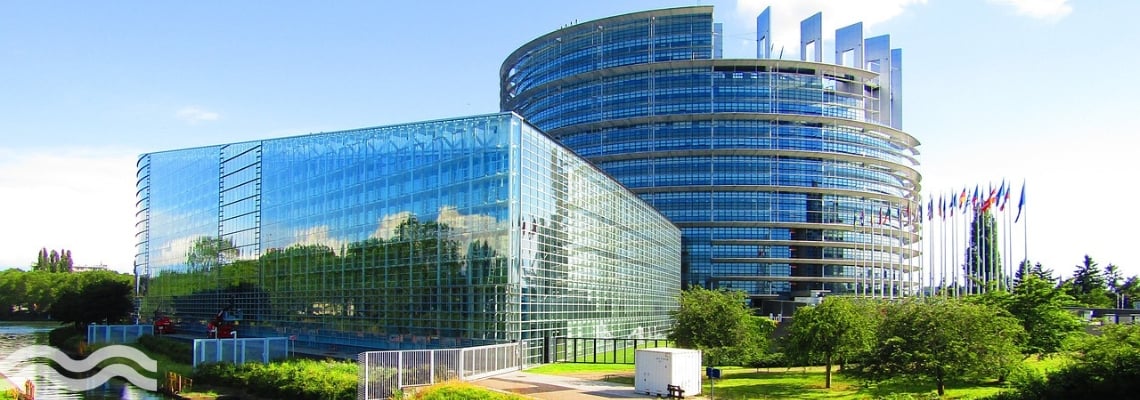
Members of the European Parliament (MEPs) have voted to adopt recommendations for the European Water Resilience Strategy that puts water at the heart of the European Commission’s 2024-2029 five-year plan.

Water resilience was put at the heart of the strategy by EU president Ursula von der Leyen following a draft report produced by rapporteur Thomas Bajada on behalf of the Committee on the Environment, Climate and Food Safety.
Following a vote in the European Parliament, MEPS chose to adopt the strategy by 470 votes in favour to 81 votes against (92 MEPs abstained from voting).
In choosing to adopt the strategy, MEPs recognised that water is essential to people’s lives and health, but also that it is central to Europe’s economy, competitiveness, and climate adaptation efforts.
Speaking after MEPs voted to adopt the strategy, Bajada said: “Our people - our families, farmers, and businesses - deserve clean, secure, and affordable water. That means moving from promises to real, binding action. We cannot afford to treat water as infinite. That is why this report calls for enforceable water efficiency and abstraction targets - sector by sector, basin by basin.”
The strategy makes a number of proposals, including introducing water efficiency targets for different sectors and industries based on basin-level assessments.
The strategy being adopted is based on the draft recommendations proposed by Bajada’s report, which was based on six key pillars: Water efficiency; pollution mitigation; climate adaptation; funding; digitalisation and innovation; and cross border cooperation.
Moving away from the outdated perception of water as an infinite resource
By adopting the strategy, MEPs are making clear that water is a transboundary challenge requiring strong international and regional collaboration. As Bajada’s report explained, the strategy requires: ‘Moving away from the outdated perception of water as an infinite resource, to recognising its intrinsic value as being essential to addressing environmental, social, and economic challenges Europe faces today, and in the near future.’
Another key focus of the strategy is on establishing EU-wide standards and controls on water pollution from pharmaceuticals, chemical pesticides and fertilisers, antibiotic-resistant bacteria, microplastics and chemicals, and Per- and polyfluoroalkyl substances.
Bajada added: “We call for a strong EU-wide response to pollution, including the full phase-out of PFAS wherever safe alternatives exist. Because these “forever chemicals” have no place in a sustainable future.”
We call for a strong EU-wide response to pollution, including the full phase-out of PFAS wherever safe alternatives exist
Following adoption, water sustainability and resilience will be the cornerstone of all EU policies, ensuring that every future policy is assessed for its impact on water quality, quantity and accessibility.
MEPs have also called for tailored measures to be adopted to specifically help prepare regions within Europe facing unique challenges beyond the remit of the general strategy, and to instil response mechanisms within policy. These challenges include climate-related events such as floods and droughts.
Another key aspect to the adoption of Europe’s resilience strategy will be investment in digital tools to improve water efficiency. For example, investing in AI solutions for real-time leak detection and smart irrigation, for improving data collection, monitoring and early warning systems, as well as improving cybersecurity of critical water infrastructures.
This report calls for enforceable water efficiency and abstraction targets
Bajada added: “We must also invest in solutions that work: Modern irrigation; smart recycling systems; real-time monitoring; and infrastructure that prevents leaks before they happen. These are not luxuries – they are the tools we need to protect our health, our food systems, and our future.”
MEPs want the European Commission to make dedicated funding available for water resilience as part of the strategy, supported by specific mechanisms within existing funds, to modernise water infrastructure, sustainable water management, nature-based solutions and innovative water-efficient technologies.
In Bajada’s draft report, it was recognised that the current multiannual financial framework (MFF) includes an ambitious but non-binding target of dedicating at least 7.5 per cent of annual EU spending to biodiversity objectives in 2024, and 10 per cent in both 2026 and 2027.
The strategy has garnered widespread approval from the water sector. EurEau, the European Federation of National Associations of Water Services, had welcomed the draft proposals, stating at the time: “Rapporteur Bajada's text rightly recognises that water resilience needs to become part of how every economic sector operates, including through binding water efficiency targets set at basin level as well as better enforcement of pollution limits.”
Following the MEPs decision to adopt the strategy, the federation published a response that began: “EurEau welcomes this report and its many positive elements. First and foremost, MEPs support a holistic source-to-sea approach to water management to ensure that our citizens, businesses and nature have access to sufficient water in the right quality for generations to come.”
Rapporteur Bajada's text rightly recognises that water resilience needs to become part of how every economic sector operates
It also welcomed the MEPs call for the Commission to ‘make water resilience funding available for modernising water infrastructure, sustainable water management, nature-based solutions and innovative water-efficient technologies’, and to uphold the ‘polluter-pays’ principle for tackling the clean-up operations need for PFAS and other pollutants.
Water Europe, posting in LinkedIn, said: “From supporting nature-based solutions, to pushing for greater investments in the water sector and leveraging the benefits of digitalisation and innovation, the Report also focus on quantity and quality of water as well as governance aspects including transboundary cooperation and source-to-sea approach.”
The post added: “Water Europe welcomes this report and is looking forward to contribute to the implementation of the Strategy.”
Also writing on LinkedIn, Grundfos welcomed the ‘positive vote’ in the European Parliament to adopt the water resilience strategy. “Water reuse technologies hold great potential to protect freshwater sources, enhance water security, let communities thrive and enable business continuity.”
A truly resilient and competitive Europe demands a water-smart economy, one that values water not just as a resource but as a driver of innovation, equity, and sustainability
Professor Fiona Regan, director of the DCU Water Institute in Ireland, explored both the costs of inaction and the cost-benefits of implementing the strategy. Regan pointed out that 38 per cent of the EU’s population are already affected by water scarcity, and critical industries valued at €192 billion are at risk, with water demand projected to triple by 2030.
She said: “A truly resilient and competitive Europe demands a water-smart economy, one that values water not just as a resource but as a driver of innovation, equity, and sustainability.”
Regan explained that implementing the strategy would require at least €255 billion in investment, but added that it could generate €3 billion in annual savings and create 13,000 new jobs by unlocking the potential of water-smart technologies.
She concluded by stating: “By establishing dedicated Water-Transition Funds and advancing a Water-Smart Circular Economy Act, we can unlock strategic investment in infrastructure, enable wastewater reuse, and foster new business models that turn water efficiency into economic opportunity.”
EurEau noted that the final vote highlighted the divisions within the European Parliament when it came to enforcing a ‘prompt and far-reaching’ PFAS ban.
It also noted that there was a call to reassess the impact of Extended Producer Responsibility (EPR) schemes in the Urban Wastewater Treatment Directive (UWWTD) on the pharmaceutical industry, which the federation believes goes against one of the building blocks of water resilience – the quaternary treatment to remove micropollutants from wastewater.